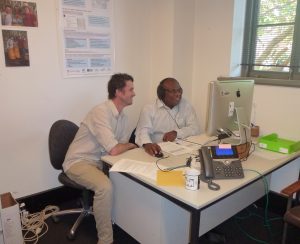Written by Steven Gagau and Jodie Kell
As part of a project to improve the metadata of PARADISEC’s Papua New Guinea collections made possible with funding from the Australian National Data Service (ANDS), PARADISEC has welcomed Steven Gagau into the Sydney office. Steven was engaged as a Research Assistant to provide language support for the project. Steven’s key role is listening to PNG collections held in the PARADISEC catalogue to find out more about the recordings and record this information into the catalogue.

Steven can be seen here with Nick Ward from PARADISEC
Steven’s role involves listening to recordings of people speaking and singing and then documenting details about the content of the collections specific to the items. He verifies the catalogue details in Title, Description, Dates, Subject and Content languages, Regions and Villages and locates on language maps. He further determines the discourse types such as language play, oratory, report, procedural, formulaic, interactive, narrative or singing.
He then edits the data and updates directly the PARADISEC catalogue for metadata enrichment thus contributing to enhancing the knowledge and information of these materials held.
Steven’s initial work was on the extensive collection recorded by Dr. Thomas (Tom) Dutton in the Kuanua language of the “Tolai” people of the Gazelle Peninsula of East New Britain Province. Dr. Dutton was a linguist with the Australian National University between 1969 and 1997. Prior to taking up linguistics Dutton was an Education Officer in the Administration of Papua and New Guinea. His many books include studies on Papuan languages and the collection digitised by PARDISEC includes his fieldwork tape recordings and other recordings developed to accompany his language learning publications.
Lately, Steven has been working on the materials in the catalogue by collectors from various regions with their language and cultural groups in PNG guided by the database of the Summer Institute of Linguistics (SIL) of PNG. Given his local knowledge of Papua New Guinea, he is able to identify the language and cultural groups to improve the metadata materials in the catalogue collections. He is now reviewing tape collections from Divine Word University (DWU) in Madang, PNG where there are a wide variety of items and discourse types being verified and enhanced in the catalogue.
Steven has extended his language and cultural knowledge to Melanesia Region where he is now involved with Vanuatu and Solomon Islands collections and can enhance the metadata in Bislama (Vanuatu) and Pijin (Solomon Islands) languages similar to Tok Pisin where are usually referred to as Melanesian Pidgin languages and are lingua franca languages in these countries.
 Follow
Follow